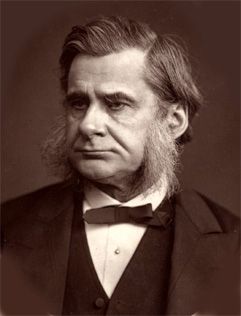
Do you remember the megachurch pastor and religious broadcaster D. James Kennedy (1930–2007)? He was a busy guy, but he found the time to preach against evolution, promoting both young-earth creationism (he was the honorary chair of Answers in Genesis’s Creation “Museum”) and “intelligent design” creationism (inviting such figures as Phillip Johnson, Michael Behe, and William Dembski to his shows). Tom McIver’s Anti-Evolution: A Reader’s Guide to Writings Before and After Darwin describes a 1986 pamphlet based on one of Kennedy’s sermons as “delivered with great confidence and authority, yet ... filled with highly misleading distortions and outright falsehoods.” Here’s a sample from Kennedy’s Solving Bible Mysteries (2000), in which he writes, “Sir Julian Huxley, the leading evolutionist in the world until his death in 1975, once said, ‘It is clear that the doctrine of evolution is directly antagonistic to that of Creation … Evolution if consistently accepted, makes it impossible to believe the Bible.’”
That’s awfully sloppy. Those words are commonly attributed in the creationist literature to Thomas Henry Huxley (1825–1895), the grandfather of Julian Huxley (1887–1975). Of course, it’s understandable for people with the same surnames to be confused, as you’ll remember from the strange case of The Three Balfours, especially with the rather folkloric way in which information (and misinformation) passes from creationist to creationist, with details vanishing and mutating en route. It’s not uncommon for the two Huxleys, both prominent biologists, to be confused together. But as far as I can tell, Kennedy is the only creationist writer to misattribute the “directly antagonistic … impossible to believe” passage to Julian Huxley. Even the disgraced but still active Jimmy Swaggart (1935–), not really anybody’s beau ideal of scholarly rigor, attributes it to Thomas Henry Huxley in his Questions and Answers (1985), which I mention only because I recently acquired the book on a whim from a used bookstore.
Did Thomas Henry Huxley ever say or write the “directly antagonistic … impossible to believe” passage? In L. Sprague de Camp’s book on the Scopes trial, The Great Monkey Trial (1968), he contends that “Huxley never said any such thing,” and credits the misattribution to John Roach Straton (1875–1929). Straton was a Baptist pastor who in the 1920s was at the Calvary Baptist Church in New York City, a fine perch from which to lead the antievolution campaigns of the Scopes era. In late 1923 and early 1924, Straton debated Charles Francis Potter of the West Side Unitarian Church on five subjects, including: “Resolved, that the world and man came by creation of a living God and not by evolution.” With regard to evolution, Straton indeed quoted Huxley thus: “It is clear that the doctrine of evolution is directly antagonistic to that of creation—as applied to the creation of the world as a whole, it is opposed to that of direct creative volition. Evolution, if consistently accepted, makes it impossible to believe the Bible.”
It’s antecedently unlikely, I think, that Straton was confabulating the quotation out of whole cloth. The part following the dash, which Kennedy omitted, is rather academic and technical in tone; if you were going to confabulate a quotation and misattribute it, wouldn’t you try to strive for something a tad incendiary? In any case, the first sentence attributed to Huxley by Straton is easy to find. For in the article on evolution in the ninth edition of the Encyclopedia Britannica—second only to the eleventh edition, in my opinion—there appears: “It is clear that the doctrine of evolution is directly antagonistic to that of creation. Just as the biological doctrine of the transmutation of species is opposed to that of special creations, so the idea of evolution as applied to the formation of the world as a whole, is opposed to that of a direct creative volition” (emphasis added, showing the words quoted by Straton). The “impossible to believe the Bible” sentence, however, is not present.
But the article on evolution is divided into two main parts. The first part is on “Evolution in Biology” and is signed with the initials THH—and it’s no secret who that is. But the second part is on “Evolution in Philosophy” and is signed with the initials JS. And the “directly antagonistic” passage appears in the “Evolution in Philosophy” part. There, in a subsection on “Evolution, Creation, and Emanation,” JS is comparing evolutionary, creationist, and emanationist (“developed by the Neoplatonists, Gnostics, and Cabalists”) doctrines respecting the origin of the world; he makes a point of stressing the antagonism between evolutionary and creationist doctrines apparently in part because, in the following paragraph, he makes a point of stressing the amenability of emanationist doctrines with both evolutionary and creationist doctrines. Let’s not worry about that. But who was JS? And where did the “impossible to believe the Bible” sentence as misattributed to Huxley by Straton and Kennedy come from? You’ll see in part 2.

